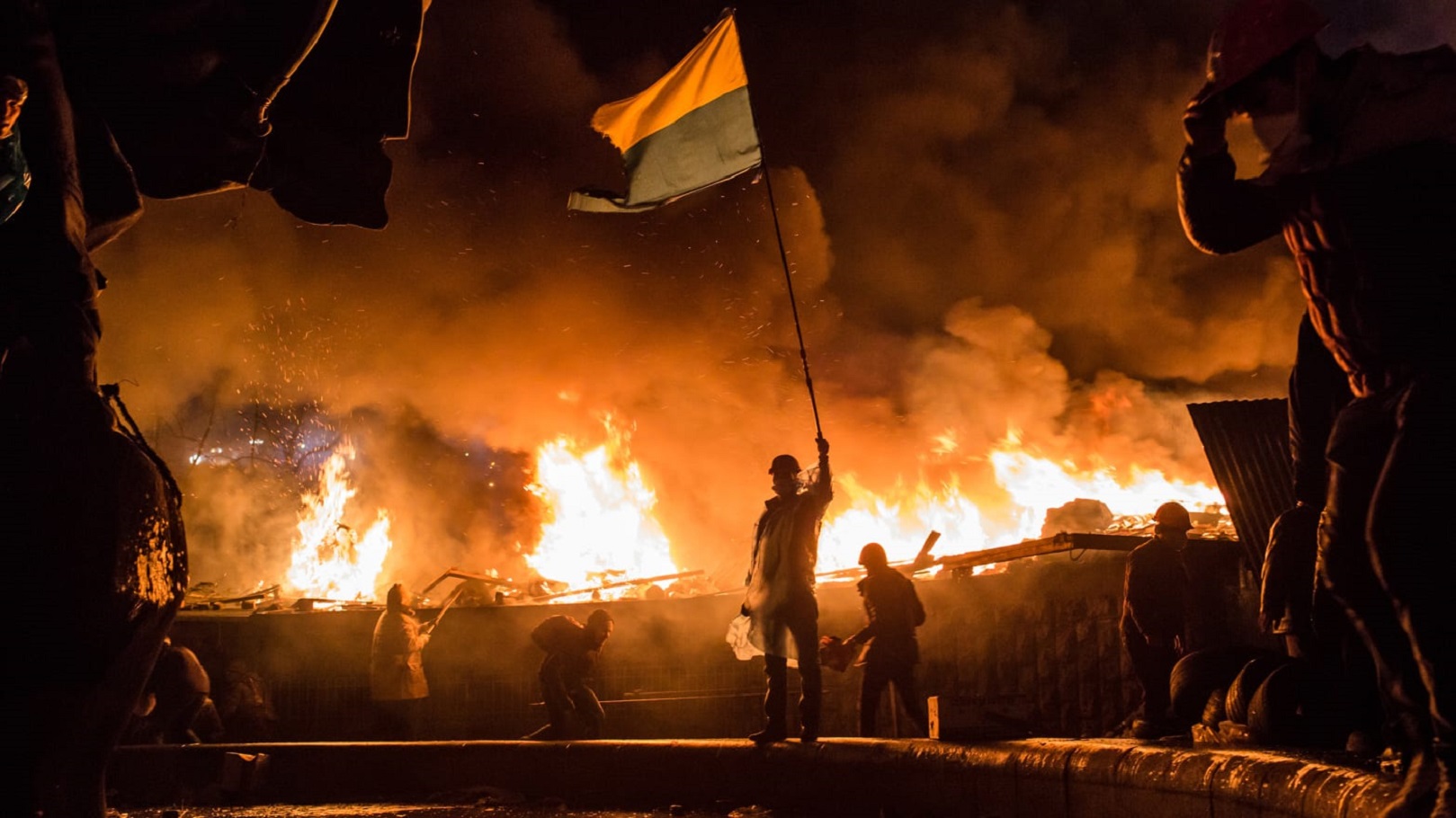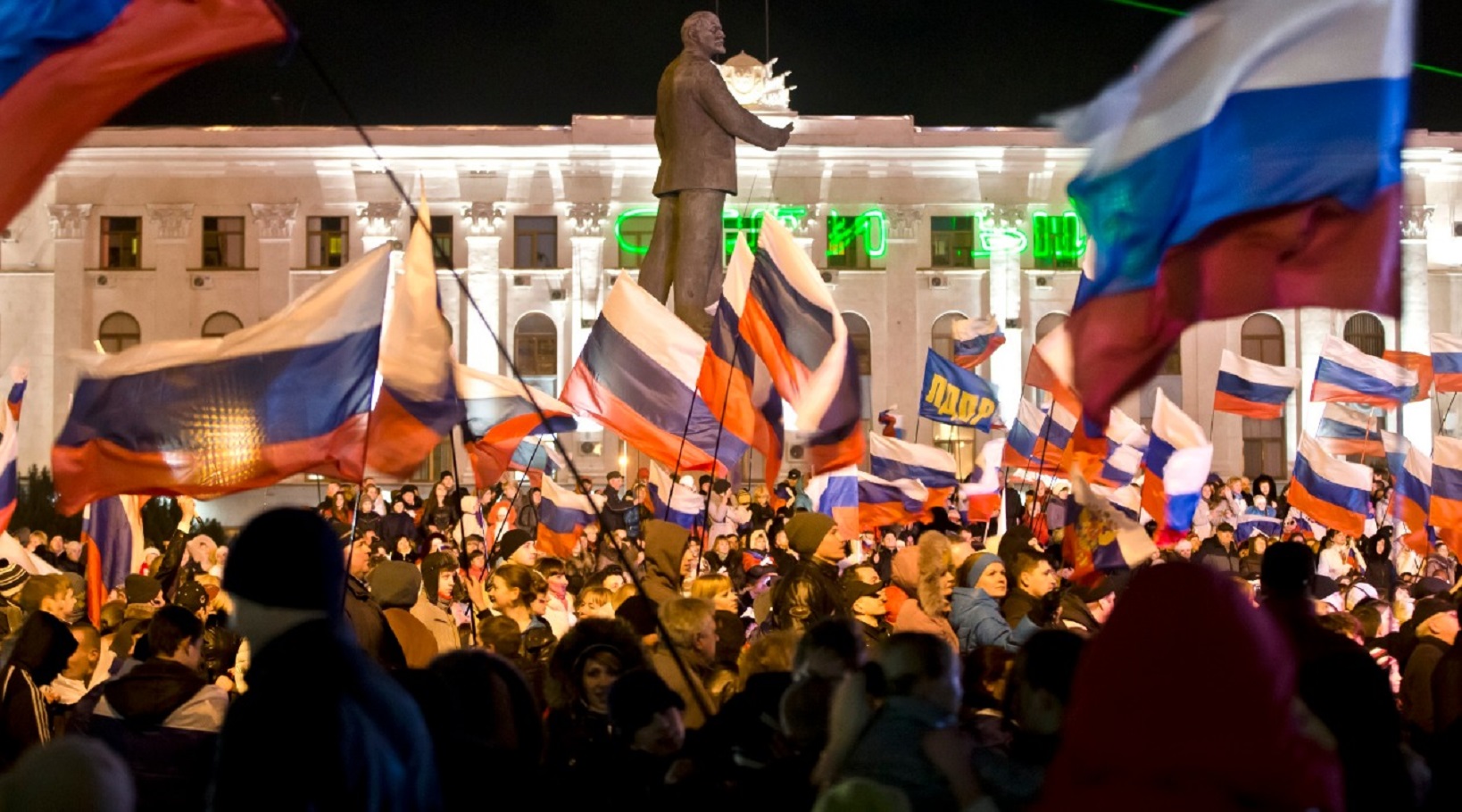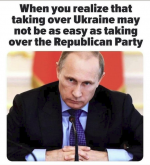You are using an out of date browser. It may not display this or other websites correctly.
You should upgrade or use an alternative browser.
You should upgrade or use an alternative browser.
Ukraine Crisis
- Thread starter annabenedetti
- Start date
Democrats and leftists falsely accused Putin of doing bad things to influence the 2016 election that he knows for a fact he was not guilty of has created a basis for Putin's greater distrust and disrespect for the US.If you desire to truly understand what brought about this conflict in Ukraine Vladimir Pozner lays out the history of the relationship between the US and Russia after the breakup of the USSR. This is, by far, the best analysis of the issues I've ever seen.
When you realize your investments in American green energy are going to tank because Hillary lost. In the years leading up to the 2016 election Putin was heavily invested in US groups advocating against fossil fuels and American energy independence, and why wouldn't he considering the fact that Russia stood to get a big boost in its oil prices if the US was made more dependent on foreign oil.

Investigate Russia’s covert funding of US anti-fossil fuel groups
Dominating the global energy market by covertly working to limit U.S. production would have been a huge coup — in more ways than one.
The letter notes that former Secretary of State Hillary Clinton complained in a speech to a private audience in 2016, “We were even up against phony environmental groups, and I’m a big environmentalist, but these were funded by the Russians ...”
Smith and Weber assert that the Russian government and “complicit parties” had a scheme that “allows money originating from foreign countries like Russia to funnel through Bermuda-based shell companies to environmental groups in the United States with the aim of disrupting the U.S. energy industry.”
They alleged that “tens of millions of dollars” were handed to Bermuda-based Klein Ltd., which then funneled the money to the Sea Change Foundation, which distributed the funds to various NGOs.
Clearly, environmental groups have had some success with their anti-fracking efforts. New York, Washington and Maryland have banned fracking. California Gov. Gavin Newsom issued and executive order last year banning fracking in the state by 2024.
annabenedetti
like marbles on glass
How un-American.
Using as your sources to bash Ukraine and the United States:
Russia state propaganda media RT, the Communist Chinese government, and your still-unvetted and unidentified ASB News.
From the National Review:
Rubio: Let me ask you, does Ukraine have chemical or biological weapons?
Nuland: Ukraine has biological-research facilities, which, in fact, we are now quite concerned Russian forces may be seeking to gain control of. So we are working with the Ukrainians on how they can prevent any of those research materials from falling into the hands of Russian forces, should they approach.
Rubio: I’m sure you’re aware that the Russian propaganda groups are already putting out there all kinds of information about how they’ve uncovered a plot by the Ukrainians to release biological weapons in the country with NATO’s coordination. If there is a biological- or chemical-weapon incident or attack inside of Ukraine, is there any doubt in your mind that 100 percent, it would be the Russians that would be behind it?
Nuland: There is no doubt in my mind, Senator. And it is classic Russian technique to blame on the other guy what they’re planning to do themselves.
On the menu today: Just when I thought I was out, they pull me back in. Why does it always come back to biological-research labs? No, Ukraine does not have a secret biological-weapons program — or at least there’s no proof of one. A biological-research facility and a biological-weapons-research facility are not the same thing — but even if Ukraine has no biological weapons, that doesn’t mean the stuff in the country’s various labs can’t be dangerous. And the U.S. — and the world — have good reasons to not want a bunch of hungry, young, poorly briefed Russian conscripts traipsing through biological-research labs with samples of who-knows-what in vials and petri dishes in the sample fridges. Meanwhile, the IAEA passes along more ominous reports from Chernobyl.
More rational non-conspiracy background info at the National Review link.
It is no surprise that Trumpers have a more favorable opinion of Putin than of President Biden.

annabenedetti
like marbles on glass
So true. What has become of them.
They are who they warned us against 20,30,40 years ago. The call really is coming from inside the house.
Democrats have a much higher opinion of communism and fascism than they do of American capitalism.How un-American.
Using as your sources to bash Ukraine and the United States:
Russia state propaganda media RT, the Communist Chinese government, and your still-unvetted and unidentified ASB News.
From the National Review:
On the menu today: Just when I thought I was out, they pull me back in. Why does it always come back to biological-research labs? No, Ukraine does not have a secret biological-weapons program — or at least there’s no proof of one. A biological-research facility and a biological-weapons-research facility are not the same thing — but even if Ukraine has no biological weapons, that doesn’t mean the stuff in the country’s various labs can’t be dangerous. And the U.S. — and the world — have good reasons to not want a bunch of hungry, young, poorly briefed Russian conscripts traipsing through biological-research labs with samples of who-knows-what in vials and petri dishes in the sample fridges. Meanwhile, the IAEA passes along more ominous reports from Chernobyl.
More rational non-conspiracy background info at the National Review link.
It is no surprise that Trumpers have a more favorable opinion of Putin than of President Biden.
View attachment 2890

Democrats have a more positive view of socialism than capitalism, poll finds
A majority of Democrats no longer hold a positive view of capitalism, while nearly 60 percent feel good about socialism, according to a new poll.
www.usatoday.com
According to a Gallup poll published Monday, a majority of Democrats no longer hold a positive view of capitalism, while nearly 60 percent of them feel good about socialism. More than 70 percent of Republicans, on the other hand, see capitalism positively, while only 16 percent of them have a positive view of socialism.
annabenedetti
like marbles on glass
Democrats have a much higher opinion of communism and fascism than they do of American capitalism.

Democrats have a more positive view of socialism than capitalism, poll finds
A majority of Democrats no longer hold a positive view of capitalism, while nearly 60 percent feel good about socialism, according to a new poll.www.usatoday.com
According to a Gallup poll published Monday, a majority of Democrats no longer hold a positive view of capitalism, while nearly 60 percent of them feel good about socialism. More than 70 percent of Republicans, on the other hand, see capitalism positively, while only 16 percent of them have a positive view of socialism.
Meanwhile, marke, Trumpers think more highly of Putin than they do Biden.
You can't fix that by dragging your never-ending supply of red herrings past it.
ok doser
lifeguard at the cement pond
On the one hand you have a shrewd ruthless cunning adversary determined to return his country to past glory... think more highly of Putin than they do Biden ...
On the other hand you have a feeble senile corrupt has-been determined to destroy the greatest country in the world
It's a tough choice
This is part one of a two part series. The recent history of Ukraine and how we got where we are.

 off-guardian.org
off-guardian.org

Timeline: Euromaidan, the original “Ukraine Crisis”
As Russia actually do launch an invasion or “special operation” in Ukraine, we thought now was a good time to recap on how we got here. The historical, political and ethnic divisions in…
 off-guardian.org
off-guardian.org
Part two of the history of Ukraine.

 off-guardian.org
off-guardian.org

Timeline: The Crimean Referendum
In part one of our recap on the recent history of Ukraine, we looked at the chain of events that lead to the removal of President Viktor Yanukovych from power. You can read that here. In this secon…
 off-guardian.org
off-guardian.org
Idolater
Popetard
So untrue. All of the Republicans who are Putin apologists are right here on TOL. There aren't very many of them, iow. If there's one thing we know about how effective Russian interference in American democracy was it's that it was 100% failure. We are a clear super majority right now against Putin and his continuing war with Ukraine (don't forget 2014 Crimea annexation). They tried to sway support in America and they failed completely, we see him for what he is.So true. What has become of them.
No.They are who they warned us against 20,30,40 years ago. The call really is coming from inside the house.
annabenedetti
like marbles on glass
I’ve studied the possible trajectories of the Russia-Ukraine war. None are good
Christopher S ChivvisWars sometimes start easily, but it is a tenet of strategy that they are always unpredictable and extremely hard to end. Putin’s war of choice in Ukraine is already escalating faster than most experts would have imagined just a week ago. He has now encircled major Ukrainian cities with his army and threatens to flatten them with thermobaric weapons, cluster munitions and guided missiles. This will terrorize the civilian population and could demoralize the budding Ukrainian resistance. He could escalate the conflict to another region, such as the Balkans, where longstanding conflicts fester and Russia has an extensive network of intelligence and security services. He may turn the lights off in a major US city with a cyber-attack. Most frighteningly, he has raised the alert level of Russian nuclear forces and may be considering introducing martial law.
Meanwhile, Nato, the G7 and a host of other countries have turned the dial of economic punishment up to unprecedented levels. Several European nations that had previously hesitated to involve themselves militarily in the conflict have now done so, sending weapons and financing Ukraine’s resistance. A growing number of voices in Washington are clamoring for a more aggressive approach from the United States and Nato, pressuring the White House to support a Ukrainian insurgency with a broad menu of weaponry or even calling for Nato to impose a no-fly zone over Ukraine.
Amid this escalation, experts can spin out an infinite number of branching scenarios on how this might end. But scores of war games conducted for the US and allied governments and my own experience as the US national intelligence officer for Europe suggest that if we boil it down, there are really only two paths toward ending the war: one, continued escalation, potentially across the nuclear threshold; the other, a bitter peace imposed on a defeated Ukraine that will be extremely hard for the United States and many European allies to swallow.
Putin deliberately frames his operation in Ukraine in the same way that the United States has framed its own regime-change operations in Kosovo, Iraq and Libya, charging that Ukraine has committed human rights violations and is a terrorist state. For good measure, Putin throws in the ludicrous assertion that Ukraine is fascist. These are transparent fig leaves for what is nothing more than a war of brute imperialism.
Judging from how things stand now, Putin, having invested so much in this war already, seems unlikely to settle for anything less than the complete subjugation of the Ukrainian government. If the current uneven pace of Russian military progress doesn’t accomplish the job, the most likely strategy for doing this is to make an example of a city like Kharkiv, leveling it as if it were Grozny or Aleppo, both cities that Russia has brutally destroyed in the recent past, and then threatening to burn Kyiv to the ground. He can accompany this with special forces attacks in the capital to disrupt the civilian population and sow further confusion and discontent. Ultimately, he needs at least to force the removal of President Volodymyr Zelenskiy and his government.
In this case, Russia will install a puppet government in Kyiv, which will sign terms of surrender highly favorable to Russia. The terms will almost certainly include a pledge of Ukrainian neutrality, and might go further by committing Ukraine formally to Russia’s sphere of influence with a membership in Russia’s Collective Security Treaty Organization or its Eurasian Economic Union.
Putin seems unlikely to settle for anything less than the complete subjugation of the Ukrainian government
At this juncture, the United States and its allies would face an extraordinarily difficult policy choice. Disgust with Putin’s war has greatly increased the chances that Washington and some of its allies would seek to fight on, for instance by supporting a Ukrainian insurgency. This would roughly mirror the strategy that the United States used to assist French resistance against Nazi Germany. The more effective Nato support to the insurgency is, the more the Kremlin would likely be willing to risk attacks on safe havens in Nato territory – most likely employing irregular forces or even the infamous Wagner Group, a private organization that operates globally as a quasi-special force of the Kremlin. These operations could lead to a massive escalation that would open the door to a much wider war between Nato and Russia – exactly the war that Joe Biden has been trying to avoid.
Alternatively, the insurgency might greatly weaken Russian forces. The Ukrainian insurgent army could impose heavy damages on Russian forces and erode Putin’s position among Russian elites, on whose support he depends for power. Ukrainian forces would have major incentives to take their fight inside Russian territory, attacking Russia’s rearguard in Belarus and Russia itself.
There are possible other paths toward further escalation, but they all eventually lead toward the nuclear threshold. Scores of war games carried out by the United States and its allies in the wake of Russia’s 2014 invasion of Ukraine make it clear that Putin would probably use a nuclear weapon if he concludes that his regime is threatened. It is hard to know exactly what turn of events would scare him enough to cross the nuclear threshold. Certainly a large Nato army entering Russian territory would be enough. But what if events in Ukraine loosened his grip on power at home? Indeed, achieving regime change in Russia indirectly by making Putin lose in Ukraine seems to be the logic behind some of those who are pushing for escalation today.
Moving across the nuclear threshold wouldn’t necessarily mean an immediate, full-force nuclear exchange – in other words, global thermonuclear war. But it would be an extremely dangerous, watershed event in world history.
The nuclear option that has been most frequently discussed in the past few days involves Russia using a small nuclear weapon (a “non-strategic nuclear weapon”) against a specific military target in Ukraine. Such a strike might have a military purpose, such as destroying an airfield or other military target, but it would mainly be aimed at demonstrating the will to use nuclear weapons, or “escalating to de-escalate”, and scaring the west into backing down.
Some analysts have questioned Russia’s ability to actually carry out such an operation, given its lack of practice. Unfortunately, this isn’t the only or even the most likely option available to the Kremlin. Based on war games I ran in the wake of Putin’s 2014 invasion, a more likely option would be a sudden nuclear test or a high-altitude nuclear detonation that damages the electrical grid over a major Ukrainian or even Nato city. Think of an explosion that makes the lights go out over Oslo.
Those war games indicated that the best US response to this kind of attack would be first to demonstrate US resolve with a response in kind, aimed at a target of similar value, followed by restraint and diplomatic efforts to de-escalate. In most games, Russia still responds with a second nuclear attack, but in the games that go “well”, the United States and Russia manage to de-escalate after that, although only in circumstances where both sides have clear political off-ramps and lines of communication between Moscow and Washington have remained open. In all the other games, the world is basically destroyed.
Even in the better case where both sides take their fingers off the triggers, the nuclear taboo has been broken, and we are in an entirely new era: two nuclear superpowers have used their nuclear weapons in a war. The proliferation consequences alone would be far-reaching, as other countries accelerate their nuclear weapons programs. The very fact that the nuclear taboo had been broken increases the odds that the nuclear threshold is crossed again in future conflicts, not just between Russia and America, but also with China, between India and Pakistan, in the Middle East, or elsewhere. Even this outcome in which the world is “saved”, the United States is far worse off than it was before the war in Ukraine broke out last month.
What is the alternative? Once again, infinite scenarios and branches are possible, but there is a single basic one that helps to simplify thinking. It begins with an effort to avoid further escalation today. So far, the Biden administration has wisely restrained direct US military involvement in the conflict, but holding off against the rising chorus of voices pushing for escalation may be hard in the coming days if Russian forces brutally devastate Ukraine’s cities. But the most difficult challenge lies a little further down the road with the scenario described above: how to respond if Russia imposes a puppet regime in Ukraine. This would put the United States in the near-impossible position of having to choose between further escalation and compromising on the very principles that drove it toward the war in the first place – the right of a nation like Ukraine to be free and independent of subjugation to foreign rule.
In this scenario, the Biden administration would have to show extraordinary leadership and strength to hold together its coalition and steer it toward restraint. It would face extremely high levels of pressure from European capitals, Ukrainian lobbies, and others to reject the puppet government and fight on, perhaps by recognizing a Ukrainian government-in-exile. The administration is already facing calls from hawkish corners of Washington to pre-empt any negotiated settlement to this war. Emotions are likely to have a much greater effect on the free democracies fighting for Ukraine than on the autocrat sitting in the Kremlin, but they will affect both sides. As they escalate, the prospects of negotiation diminish further.
Would Nato’s door remain open to a Russian-dominated Ukraine? Probably, but it would be similar to claiming that Nato’s door is open to North Korea or Iran (which it theoretically is). All of the consequences that are likely from this conflict – growing conventional force buildup on the Nato-Russia border, higher levels of defense spending in the United States at the expense of domestic programs, an end to efforts to draw down US military posture in the Middle East, and fewer resources for strategic competition with China – would still be a better outcome than the alternative, in which nuclear weapons have been used.
Wars can start quickly or slowly, but it is a dictum of strategy that once started, they take on a logic of their own. It is not too soon to think about how to bring this war to a close. The chances that Putin emerges strategically weak are real. But that does not mean the US can win. It will have to settle for a picture that is much uglier than it was before the war, and the sooner Washington accepts that, the better.
Christopher S Chivvis is the director of the American Statecraft Program at the Carnegie Endowment for International Peace
Idolater
Popetard
The good thing that can come out of this assuming we don't plunge into WWIII is how battered Russia's economy is in all this. There's no way that China hasn't had to rethink whatever they might have been thinking about Taiwan and general belligerence. We could destroy China's economy just as easily as we're destroying Russia's economy.
You seem to be pretty ignorant of the facts.The good thing that can come out of this assuming we don't plunge into WWIII is how battered Russia's economy is in all this. There's no way that China hasn't had to rethink whatever they might have been thinking about Taiwan and general belligerence. We could destroy China's economy just as easily as we're destroying Russia's economy.
Russian debt to GDP ratio: 17.8% in 2020
US debt to GDP ratio: 128% in 2020 The last 5 years running our debt to gdp ratio has been more than 100%. And 80% of all dollars ever printed have been printed in the last two years meaning the value of the dollar has shrunk incredibly fast. It's one of the reasons we have high inflation rates.
Who is in more economic distress? The US or Russia? Which nation's economy will be hurt more by economic downturns?
Idolater
Popetard
Ruble down over 50% in value in two weeks.You seem to be pretty ignorant of the facts.
Russian debt to GDP ratio: 17.8% in 2020
US debt to GDP ratio: 128% in 2020 The last 5 years running our debt to gdp ratio has been more than 100%. And 80% of all dollars ever printed have been printed in the last two years meaning the value of the dollar has shrunk incredibly fast. It's one of the reasons we have high inflation rates.
Who is in more economic distress? The US or Russia? Which nation's economy will be hurt more by economic downturns?
I don't doubt that some who support Trump have a higher opinion of Putin than they do of Biden. I can see why.Meanwhile, marke, Trumpers think more highly of Putin than they do Biden.
You can't fix that by dragging your never-ending supply of red herrings past it.
So? Even if true Russia has been buying gold for years and selling US debt for years. Meaning they have been setting up a gold based economy. The US has no gold. The dollar and the credit system are based on debt. When the economy collapses how many people can pay their debts? What happens then to the US economy? It stops.Ruble down over 50% in value in two weeks.

